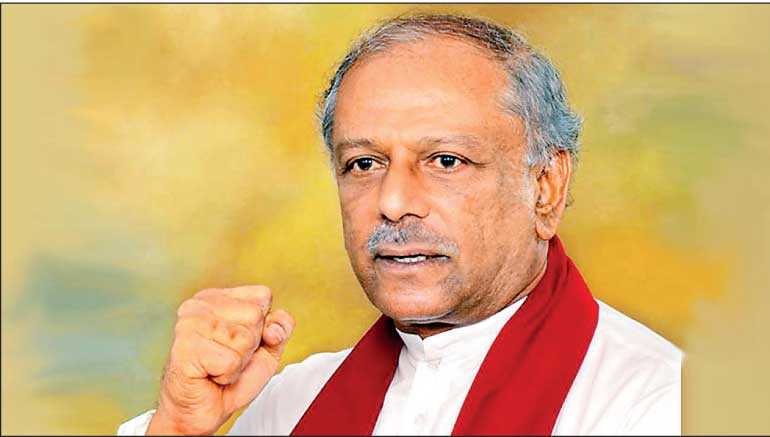Tuesday Feb 17, 2026
Tuesday Feb 17, 2026
Monday, 27 April 2020 00:35 - - {{hitsCtrl.values.hits}}

Labour Minister Dinesh Gunawardene
‘So long as a society is relatively stable and unchanging, the problems it presents to men tend to be routine and predictable. Organisations in such environment can be relatively permanent. But when change is accelerated, more and more novel first time problems arise, and traditional forms of organisation prove inadequate to the new conditions. They can no longer cope’ – ‘Future Shock’ by Alvin Toffler.
There is no question that we have to a situation where our traditional environment has been changed in an unimagined way causing novel business situations. What is our response to this ‘novel virus’ which has turned the whole economy upside down globally?
A participant in a meeting with the current Labour Minister Dinesh Gunawardene stated that it was like talking to a brick wall! I don’t blame the Minister for ‘stonewalling’; he has to play his role according to a script which makes him the protector of the worker. The question is, who is the protector of business? There must surely be a minister who likewise has to protect business interests for the sake of the economy?
The next issue is that business interests need to be positive in searching for solutions and breaking down the ‘wall’! After all, the Berlin Wall also had its date with the demolishers.
The Minister of Labour is the son of the diehard leftist Philip Gunawardene who was in his final spell as a politician pragmatic enough to join Dudley Senanayake’s national government and actively participate to save the country. My point is that the business community needs a leadership which persuades people in authority to change. For this there has to be an approach which clearly sets out solutions which are politically palatable and positioned as vital to save the economy.
There are different stakeholder interests to keep in mind. The people within the organisation, which means the management and employees. Then we also have the community or the people outside who are impacted by what happens to people within. The investors who are not necessarily locals are a third category, and finally the Government which embraces the economic interests and the political or people centric interests.
As for the internal stakeholder community, the immediate issue is that even if employees come to work and are super-efficient, without orders and need for services they would be wasting their time and the meagre resources still available and which would run dry soon. They may not be able to access fresh materials when the inventory available runs out. The organisation needs to strategise on how this sudden change needs to be met by rebuilding markets.
Cooperation internally also envisages sacrifices which need to be made by the people within in the form of payments to them to tide over the unfortunate tsunami that hit them and which is not the fault of the organisation. If this does not happen peacefully by dialogue and consensus the whole organisation is likely to collapse fast.
Investors have already enough worries and their wealth in terms of their share values has been shattered and squeezed out. Is it not wise for them to liquidate unless they are confident that there is a willingness within the organisation to recognise the need for total cooperation to make it viable and sustainable?
What is the interest of the State? The economy has to be made stable as quickly as possible. Sri Lanka may not be in the happy position of providing employees who are not paid salaries with some financial support as is happening in developed economies. In the US those expecting a handout are now in excess of 24 million as of today – more than our population!
I recall that during the JVP/DJP disturbances of the late 1980s the Government helped the hospitality trade with wages for a considerable period of time. When the Galadari Hotel was bombed the Treasury gave the owners a loan of 100 million to rebuild it! The Government has a responsibility to examine how it could help the private sector to survive because it in turn helps the economy to be stable.
To sum up:
1. As much as the Minister of Labour justifiably wishes to safe guard employee interests, there have to be spokesmen for the economy and for trade to speak up and say what they need to keep our ship of State afloat.
2. The reorganisation of businesses has to take place internally and this must be encouraged by the Government and its ministers. Interference should be only where there are disputes. Most employees can see the realities facing their employers but wrong signals from politicians can cause mischief. The Government also needs to see what can be done with the vast resources available in super-annuation funds held by the Government in trust for employees, which as we have seen is often unwisely invested.
3. This is a situation which calls for innovative thinking and to look for an ad-hoc solution is justified. As we know there are many laws which are observed in the breach. To administratively agree to allow employers to first find their feet again before being forced to comply with laws is imperative. The engine of growth is stuck and the Government if committed to free enterprise has to apply its shoulder to the wheel to save the day.